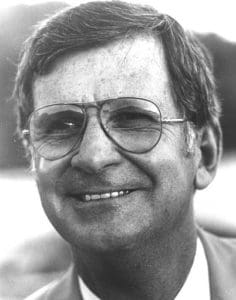
Ron de Lugo, the first and longest-serving Delegate to Congress from the U.S. Virgin Islands, died Tuesday at the age of 89.
His wife, Sheila Paiewonsky de Lugo, said he passed away on July 14 in Florida, after several years of failing health.
De Lugo, whose political career spanned four decades, played a key role in bringing about sweeping changes that in the middle of the 20th Century accelerated the political advancement and economic development of the U.S. Virgin Islands, and also of America’s Pacific territories.
De Lugo’s family first settled in Puerto Rico in the 1500s and moved to St. Thomas in 1879. Ron was born on August 2, 1930. He grew up on St. Thomas and attended Sts. Peter and Paul School before transferring to the Colegio San Jose in San Juan, Puerto Rico.

After a two-year stint in the U.S. Army, serving with Armed Forces Radio, De Lugo returned to St. Thomas in 1950 and became a very popular radio personality at WSTA, which was just being established as the territory’s first commercial radio station.
When a group of civic leaders on St. Thomas began to plan a 1952 revival of Carnival on St. Thomas, De Lugo became the enthusiastic, tireless promoter and cheerleader who generated the spirit which made St. Thomas Carnival and later the related St. Croix and St. John Festivals the biggest cultural events in the territory.
In 1955, De Lugo moved to St. Croix and soon began a career in public service that defined the rest of his life. He was elected to the Virgin Islands Legislature in 1956 and 1958, was appointed St. Croix Administrator in 1961 and was then again elected to the Legislature in 1962 for two more terms.
In 1968, De Lugo was elected to the newly-created post of Washington Representative, whose objectives included persuading the federal government to give the territory the right to elect its own Governor and to have an official Territorial Delegate in the House of Representatives.
De Lugo became effectively the Vl. Government lobbyist in DC working with the V.I. governor and other public and private sector leaders to enlist the support of the Washington decision-makers.
De Lugo proved to be very good at person-to-person coalition building, especially with powerful leaders like Philip Burton (D-CA). Within a few years, that coalition finally ended the era of Navy Rule and appointed governors for the territories.
Instead, they secured the Elected Governors Act of 1968, the seating of Delegates to Congress from Guam and the U.S. Virgin Islands in 1972, and American Samoa in 1980.
By 1989, de Lugo became chair of the Interior Subcommittee on Insular and International Affairs. He helped negotiate and secure passage of the Compact with the Commonwealth of the Northern Marianas Islands and Free Association for the Republic of Palau.
De Lugo also sponsored several bills extending the right to vote in presidential elections to citizens in the offshore territories, and introduced bills and held hearings in Puerto Rico and Washington, DC on status options for that island.
While the delegates were not empowered to vote on final passage of legislation on the floor of the House, they leveraged their votes in committee to secure state-like treatment for roads, harbors, airports, schools, hospitals, disaster aid, environmental projects, welfare and other federal programs critical to the economic and social development of the territories.
Federally funded projects in the Virgin Islands successfully promoted by Delegate De Lugo included a $90 million expansion of the St.Thomas airport and major improvements to the St. Croix airport, new hospitals on St.Thomas and St. Croix, expansion of the cruise ship dock in Crown Bay and the Frederiksted pier, and $1 billion in federal disaster aid after Hurricane Hugo. Education funding for the Virgin Islands was increased, and in 1986 De Lugo had legislation passed including the University of the Virgin Islands as one of the nation’s Historically Black Colleges and Universities, thus eligible for HBCU grants for the university and its Eastern Caribbean Center. De Lugo’s Alien Adjustment Act of 1982 offered permanent status to qualified temporary workers who overstayed their entry permits, setting a precedent by resolving a long-standing immigration issue without rancor. He legislated the transfer of Water Island from the federal government to the Virgin Islands, and had Salt River, St Croix, the only known Columbus landing site under the American flag, designated a National Park and Ecological Preserve with joint administration by the local government, and numerous other initiatives that benefited the Virgin Islands.
Ron De Lugo served 10 terms as Delegate in the House of Representatives, from 1973 to 1979 and from 1981 to 1995, his Congressional service interrupted by an unsuccessful run for VI Governor in 1979.
Throughout his years in Washington, De Lugo had to defend special status and tax advantages the Virgin Islands enjoys, including exemption from the Jones Act and the return of excise taxes collected by the federal government on imported Virgin Islands rum.
Ron De Lugo retired from Congress in 1995.
In 2003, then Delegate to Congress Donna Christensen sponsored legislation naming the Ron de Lugo Federal Building in St. Thomas. Here is the pamphlet from that naming ceremony, with some background information on de Lugo’s life.
In 2014, De Lugo was awarded an honorary doctorate by the University of the Virgin Islands.
He was predeceased by a son, James, and a daughter, Maria Cristina de Lugo Gino. In addition to his wife, Sheila Paiewonsky de Lugo, he is survived by his brother, Winston S. de Lugo, his first wife Maria Morales Viera, by his children, Angela Maria de Lugo, Alex Chamorro and Rebeca Chamorro Levin, and by five grandchildren and two great-grandchildren.
Due to the pandemic, a public service will be held at a later date to be announced.